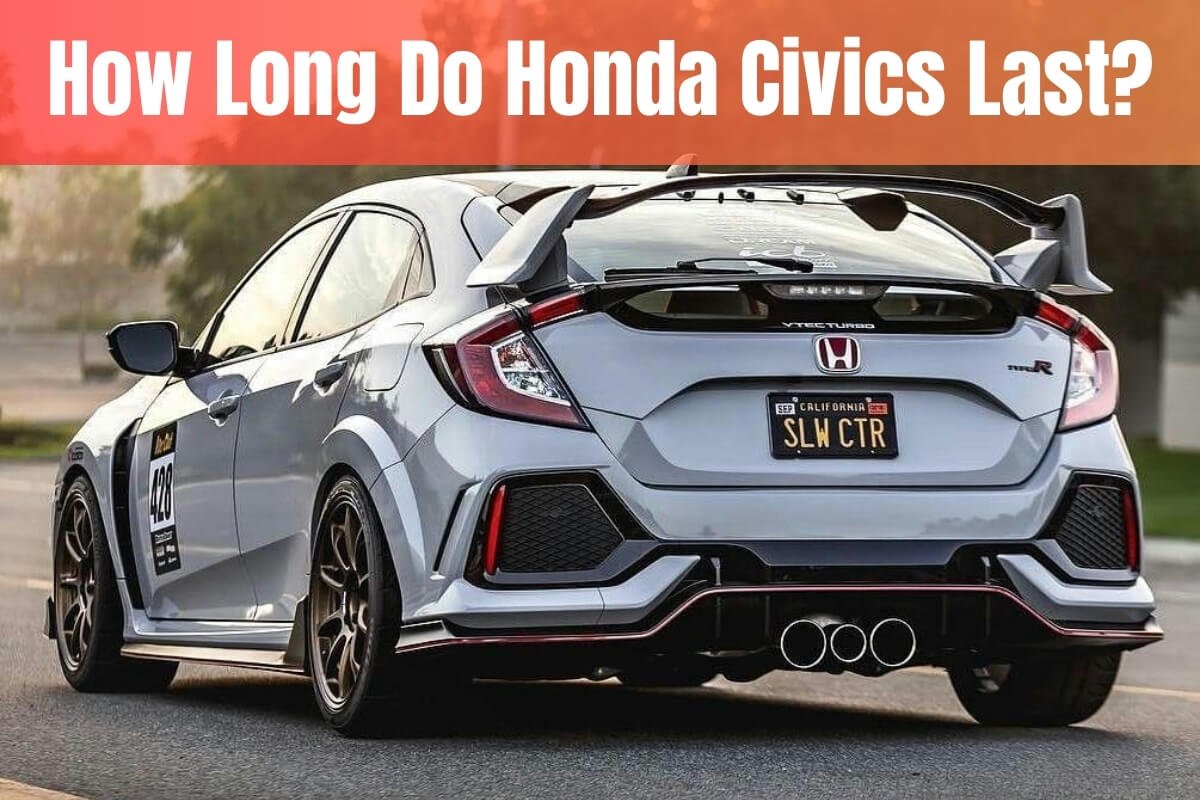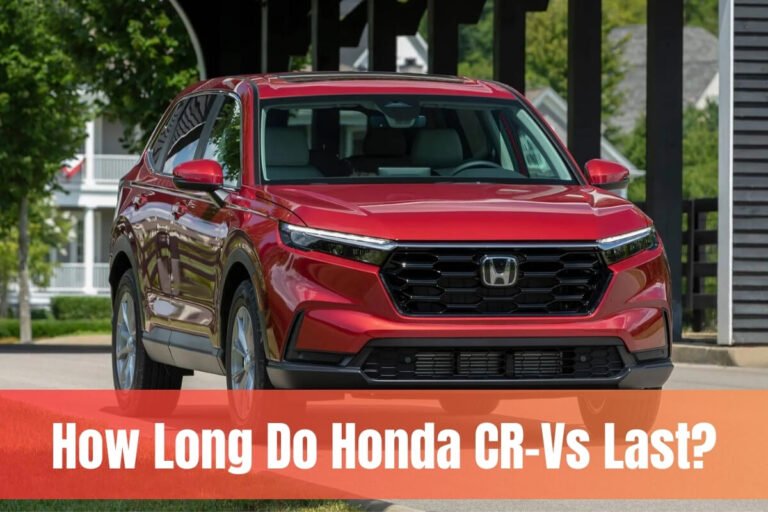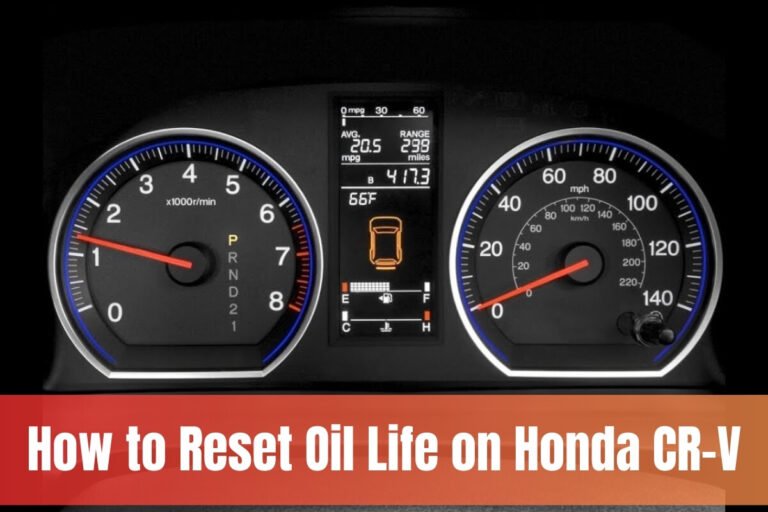How Long Do Honda Civics Last? A Reliable Car’s Lifespan

The Honda Civic is a name that resonates with car enthusiasts and everyday drivers alike. For decades, this compact car has been a symbol of reliability, efficiency, and affordability. Whether you’re a first-time buyer or a long-time Civic owner, one question that often comes to mind is, “How long do Honda Civics last?”
In short, a well-maintained Honda Civic can last between 200,000 to 300,000 miles or 15 to 20 years. However, the actual lifespan of your Civic depends on various factors, such as maintenance, driving habits, climate, and road conditions.
In this comprehensive guide, we’ll explore the impressive longevity of Honda Civics, delving into the average lifespan, common issues to watch out for, best and worst model years, and tips to help you maximize the life of your beloved Civic. Whether you’re a current owner or a prospective buyer, this article will equip you with valuable insights to make an informed decision.
The Average Lifespan of a Honda Civic: How Many Miles Can You Expect?
When it comes to the lifespan of a Honda Civic, the numbers are impressive. According to numerous reports and studies, a well-maintained Civic can last between 200,000 to 300,000 miles, which translates to approximately 15 to 20 years of service. This remarkable lifespan is a testament to Honda’s commitment to quality and reliability.
It’s important to note that these figures are not set in stone; they are averages based on real-world experiences of Civic owners who have followed proper maintenance schedules and driving practices. Some Civics have even surpassed the 300,000-mile mark, further solidifying their reputation as dependable companions on the road.
Factors That Influence a Honda Civic’s Longevity
While the average lifespan of a Honda Civic is remarkable, several factors can impact its longevity. Understanding these factors can help you make informed decisions and take proactive measures to ensure your Civic remains in top condition for years to come.
- Maintenance and Service: Regular maintenance, such as oil changes, tire rotations, and scheduled servicing, plays a crucial role in extending a Civic’s life. Neglecting these essential tasks can lead to premature wear and tear, potentially reducing your car’s lifespan.
- Driving Habits: How you drive your Civic can significantly influence its longevity. Aggressive driving, frequent stop-and-go traffic, and harsh driving conditions can accelerate wear and tear on various components, including the engine, transmission, and suspension.
- Climate and Road Conditions: Extreme weather conditions and poor road quality can take a toll on a car’s components, potentially reducing its lifespan. For example, coastal areas with high humidity and salt in the air can lead to accelerated corrosion, while regions with harsh winters can put additional strain on the vehicle.
- Manufacturing Quality: While Honda is known for its high-quality standards, certain model years or production runs may have potential issues that could affect longevity. It’s essential to stay informed about any recalls or known problems with specific Civic models.
Common Honda Civic Issues and How to Address Them
While Honda Civics are renowned for their reliability, they are not immune to potential issues. Staying informed about common problems and addressing them promptly can go a long way in ensuring your Civic’s longevity.
Airbag Indicator Light Issues
Several Civic models, including those from 1996, 2001 to 2016, have experienced issues with the airbag indicator light due to a malfunctioning occupant position sensor. Honda has issued recalls to replace the faulty sensors at no cost, but you may still need to pay for diagnostic fees at an auto shop, typically ranging from $88 to $111.
Engine Mount Vibrations and Rattles
Faulty engine mounts can cause vibrations, roughness, and rattles, especially when the car is in reverse or at high speeds. This issue is one of the most cited concerns among Civic owners. Replacing the engine mounts is typically the solution for this unsettling problem.
Power Window Switch Failure
Some Civic owners have reported intermittent failure of the power window switches, preventing the windows from opening or closing correctly. Oddly, some owners have found temporary relief by applying extra force to the switches. When addressing this issue, it’s crucial to distinguish between a failing switch and a defective window motor to avoid unnecessary replacements and expenses.
Cracked Engine Blocks
Older Civic models may be susceptible to cracked engine blocks, leading to issues like excessive exhaust smoke, coolant leaks, and engine overheating. Some repair shops choose to weld the cracks sealed or glue them with high-quality sealants, but the quickest and most common solution is to replace the engine block altogether, which can cost around $3,000.
Transmission Failure
Common complaints regarding the Civic’s transmission include slipping gears, difficulty in gear shifts, grinding or shaking, a burning smell, and leaking transmission fluid. Timely diagnosis and repair or replacement of the transmission are crucial to prevent further damage and potential engine failure.
Best and Worst Honda Civic Model Years: A Closer Look
While Honda Civics generally have a reputation for reliability, some model years stand out as particularly reliable or problematic. Understanding the best and worst years can help you make an informed decision when buying a used Civic or planning for future maintenance and repairs.
The Best Honda Civic Model Years
- 2006: Known for its great fuel economy and reliability, the 2006 Honda Civic is a popular choice among used car buyers.
- 2010: Praised for its design consistency and stability, the 2010 Civic has a low likelihood of costly repairs, according to surveys from FixDapp.
- 2016-2021: Considered the “golden era” of the Honda Civic, these models boast impressive fuel economy, upscale interiors, and pleasant handling, solidifying their position as top contenders in the compact car segment.
The Worst Honda Civic Model Years
- 2001: Plagued by exhaust system issues and transmission failures, the 2001 Civic has earned a reputation as one of the worst model years.
- 2003-2005: Honda’s early hybrid models faced battery and running time issues, which shortened their lifespans to less than ten years in some cases.
- 2009 and 2011: Criticized for poor wheel systems and interior designs in their hybrid variants, these model years received mixed reviews from Civic owners.
Tips to Extend Your Honda Civic’s Lifespan: Maximizing Your Investment
Owning a Honda Civic is an investment, and taking proactive steps to extend its lifespan can save you money and hassle in the long run. Here are some tips to help you maximize the life of your beloved Civic:
- Study the Owner’s Manual: Familiarize yourself with the recommended maintenance schedules and follow them diligently. This will ensure that your Civic receives the proper care it needs at the right intervals.
- Change the Oil Regularly: Regular oil changes are crucial for maintaining your Civic’s engine health. Use high-quality fluids and follow the recommended intervals in your owner’s manual.
- Wash Your Civic Regularly: Dirt, salt, and other harmful substances can accelerate corrosion and damage to your Civic’s exterior and undercarriage. Wash your car regularly to protect it from these elements.
- Park in Shaded Areas: Prolonged exposure to direct sunlight and high temperatures can take a toll on your Civic’s interior and exterior components. Park in shaded areas whenever possible to minimize heat and UV damage.
- Monitor Tire Pressure and Rotate Tires: Properly inflated and rotated tires not only improve fuel efficiency but also extend the life of your Civic’s suspension and drivetrain components.
- Drive Responsibly: Aggressive driving, such as rapid acceleration, hard braking, and taking corners at high speeds, can put unnecessary stress on your Civic’s components. Drive responsibly and avoid harsh driving conditions whenever possible.
- Combine Trips: Frequent stop-and-go situations can accelerate wear and tear on your Civic’s components. Whenever possible, combine multiple trips into one to minimize the strain on your vehicle.
Is a Honda Civic Expensive to Maintain?
One of the advantages of owning a Honda Civic is its relatively low maintenance costs. According to RepairPal, the average annual maintenance cost for a Honda Civic is around $400, which is considered low for a compact car.
While maintenance costs may vary based on location, specific repairs needed, and the age of your Civic, the overall cost of ownership is generally affordable compared to other vehicles in the same class. By following the recommended maintenance schedules and addressing issues promptly, you can help extend the lifespan of your Civic and keep it running smoothly for years to come.
Regular maintenance tasks for the Honda Civic typically include:
Oil and Filter Changes Honda recommends getting your Civic’s oil and filter changed every 7,500 miles or 12 months, whichever comes first. This routine service helps ensure proper lubrication and protection for your engine.
Tire Rotations and Replacements Rotating your tires every 7,500 miles can help promote even tread wear, while replacing tires when they become worn or damaged is essential for maintaining good traction and handling.
Brake Inspections and Services Having your brakes inspected regularly and replacing brake pads and rotors as needed is crucial for safe stopping performance.
Fluid Level Checks and Replacements Routine checks and replacements of fluids like coolant, transmission fluid, and brake fluid help prevent leaks, overheating, and other potential issues.
Air Filter Replacements Replacing the air filter according to the recommended schedule improves engine performance and fuel efficiency.
Spark Plug Replacements Depending on your Civic’s model year and engine type, spark plugs may need to be replaced every 30,000 to 100,000 miles.
Additional Services Other services like cooling system flushes, transmission fluid changes, and timing belt replacements may be recommended at specific mileage intervals.
Final Verdict
Owning a Honda Civic can be a rewarding experience, with its reputation for reliability, efficiency, and affordability. By staying on top of regular maintenance and addressing any issues promptly, you can enjoy your Civic for many miles and years to come. Keeping up with the recommended service schedule not only helps ensure your vehicle’s longevity but can also improve its performance, fuel economy, and overall driving experience. With proper care and attention, your Honda Civic can continue to be a dependable and cost-effective mode of transportation.






